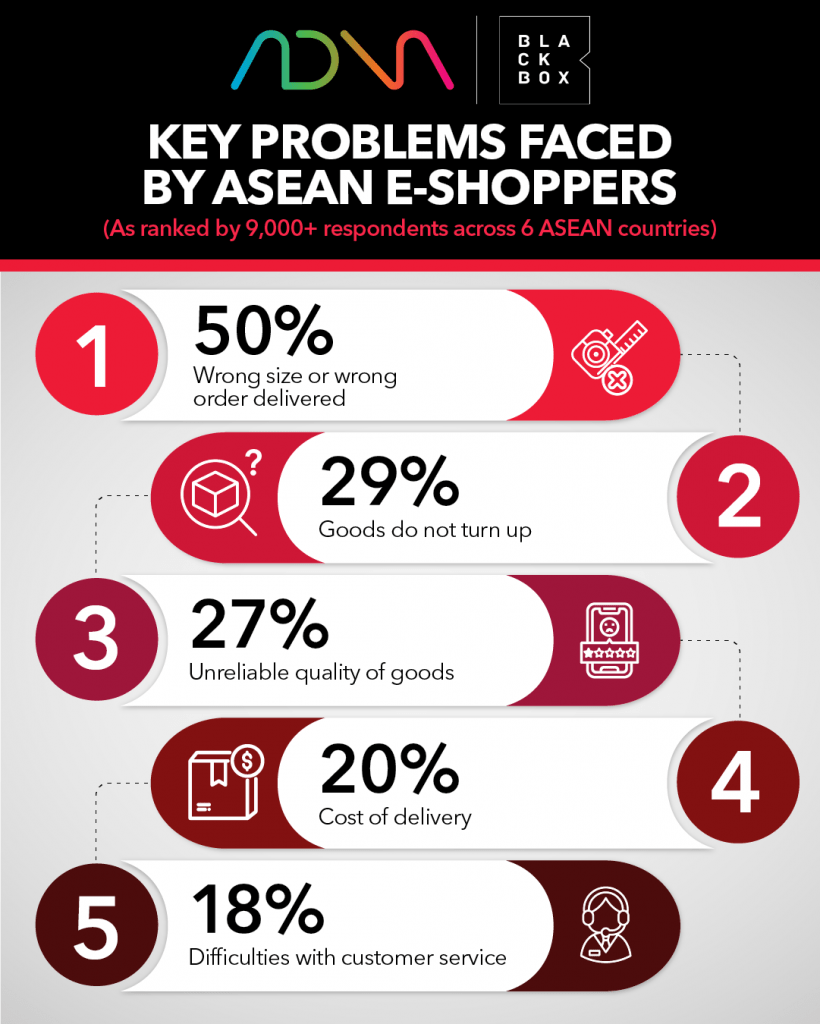Digital ASEAN: Regional E-shoppers Demand Better From Platforms
Many sectors took a body blow during the COVID-19 pandemic, and while rising inflation may have curbed consumer spending, the e-commerce sector continues to not just survive but thrive. Southeast Asia reportedly witnessed 70 million additional online shoppers since the start of the pandemic. This seems obvious with online shopping being the only available option for many people during lockdowns, but what emerged out of necessity is now turning into a habit.
Blackbox and ADNA spoke to over 9,000 respondents across key ASEAN markets—Malaysia, Singapore, Indonesia, Philippines, Thailand, and Vietnam—for their views on online shopping. The top reasons for choosing online shopping are convenience (43%), discounts (33%), variety of choice (25%), getting the latest trends fast (20%), and getting things online that may not be available locally (19%).
Today’s e-shopper expects more
The ASEAN e-shopper is growing up and becoming discerning. While the advantages of online shopping are known to most, what can set an e-commerce site apart from its competitors is a willingness to tackle the pain points of e-shoppers.
The Blackbox-ADNA study highlights that the chief concern for half the shoppers in Southeast Asia (50%) today is the failure to fulfil, that is the wrong size or wrong order being delivered. This is followed by goods not showing up (29%), unreliable quality of goods (27%), cost of delivery (20%), and difficulties with customer service (18%).
AI as a potential saviour?
With wrong sizes being a pet peeve, Artificial Intelligence (AI) can come to the rescue of apparel brands. For example, AI-driven companies like Bold Metrics incorporate body modelling technology to make smart size recommendations, without the need for tape measures, selfies, or scanners. Customers need to simply answer a few questions and the AI predicts body measurements. The company even claims to have helped apparel brands and retailers boost average conversion by 20% while reducing return rates by 32%.
Other popular players such as Presize.ai (acquired by Meta in 2022) ask customers to turn around in front of their smartphone cameras. This generates a 3D human body model and customers are automatically recommended their ideal fit and size. With AI technology constantly advancing, the preciseness of these tools will only keep getting better, potentially leading to massive additional revenue through the lesser likelihood of returns. Presize, in fact, claims that the current conversion rate on apparel sites is a mere 2% and their solution can “enrich the average shopping cart by 10%”.
Boosting confidence among shoppers
E-commerce scams are a growing concern in Southeast Asia as the region experiences rapid growth in online shopping. One common scam is the ‘fake online store’, wherein scammers set up a website that appears to be a legitimate e-commerce site, but they are actually trying to access customers’ financial information and personal data. These fake sites often offer popular items at too-good-to-be-true prices, enticing unsuspecting shoppers.
Another popular scam is the ‘advance fee fraud’, where the scammer demands an advance payment for a product or service that they never deliver. With 29% respondents in our survey highlighting the problem of “goods not showing up”, it is possible that many are falling prey to this. Such scammers usually contact the victim through social media or email and make a convincing pitch for the product, asking for an advance payment to secure it. It works the other way too, as seen in the fake buyers scam on online marketplace Carousell.
There is also the counterfeit product scam, where criminals sell fake versions of popular products such as luxury goods, electronics, and even medicines. These fake products are often of poor quality and can be harmful to the consumer. “Unreliable quality of goods” is a concern for 27% of Southeast Asian shoppers in our survey.
While countries like Singapore have stricter laws to convict scammers, such as up to 3 years of imprisonment, tracking and recovering any money lost continues to be a challenge. The onus, therefore, lies on e-commerce platforms and shoppers to remain hypervigilant when it comes to making online purchases while governments on their part can continue to enact more stringent laws and harsher punishments to serve as deterrents.
Lastly, customer service is the lifeline of any business, and right from the initial visit to the site to the checkout process to the final delivery of goods and any unresolved issues, every e-commerce site needs to have a customer delight team to ensure confidence among shoppers and repeat purchases. With poor customer service being a concern for 18% of Southeast Asian shoppers, this is clearly a pain point worth addressing sooner rather than later.
Online Shopping has become a habitual practice among Southeast Asians, but companies need to be mindful about their customers’ pain points. Moreover, just like everything else digital, consumers, businesses, and governments need to maintain their vigilance against bad-faith actors whose actions will negatively impact the industry. To find out more about how our insights help businesses worldwide, reach out to us on connect@blackbox.com.sg.

